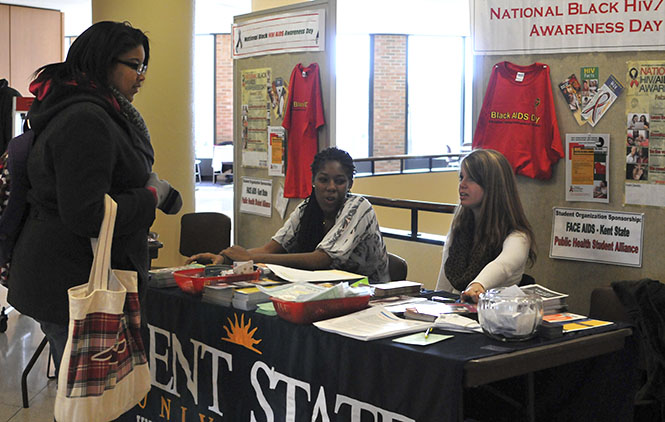Student organizations set up table for National Black HIV/AIDS awareness day
Celicia Cardoso, sophomore Public Health and Spanish major, and Shannon Zimmerman, sophomore Public Health major, talk to a student visiting the University Health Services booth about National Black HIV/AIDS Awareness Day on Thursday Feb. 7. The booth offered free condoms, informational pamphlets and risk reduction kits for students to take with them, as well as information on free and confidential HIV testing offered by the College of Public Health. Photo by Jessica Denton.
February 8, 2013
The Office of Health Promotion and two student organizations recognized National Black HIV/AIDS awareness day Thursday.
FACE AIDS-Kent and the Public Student Health Alliance staffed an information outreach table in the Student Center to bring awareness to the 13th annual observance of this day. Students gathered around the table between 11:30 a.m. and 2:30 p.m.
“Its really amazing to see all of these people come together for this one day, just to bring awareness to an issue that really doesn’t get as much as it deserves,” said Tom Ream, president of FACE AIDS-Kent.
Ream said this is one of the biggest awareness days on Kent’s campus.
“African Americans are disproportionately affected by AIDS if you look at the statistics,” Ream said. “This is a really important day just to get awareness out there and [to make] sure people know their status. That’s the biggest thing you can do in order to fight this pandemic, is just know where you stand.”
According to the Center for Disease Control and Prevention Facts Sheet, blacks account for almost 50 percent of people living with HIV in the US, and nearly half of new infections each year.
“This is an opportunity for students to reflect on ways to reduce their risk for HIV/AIDS as well as other sexually transmitted infections,” said Scott Dotterer, coordinator of the Office of Health Promotion.
The theme of this community mobilization initiative, Dotterer said, is aimed at getting educated, getting tested, getting treated and getting involved.
“Getting the message out there that the black community is specifically affected, in a way that most other people can’t even fathom, is something that really needs to be put out there to the public,” Ream said.
The table included informational packets and materials on HIV/AIDS and risk reduction and “life saver” kits. These kits included condoms and how-to manuals.
FACE AIDS lapel pins were also available for sale at the table. FACE AIDS-Kent works directly with HIV-positive patients or those associated with the patients in Rwanda, who make the pins and send them to the United States, Ream said. All of the earnings then go back to Rwanda to fund treatment or comprehensive health care to those in need.
The day also stressed the importance of getting tested. Free confidential HIV testing is available through the University Health Center, and the next date for testing is Feb. 21.
“Even if you think ‘oh it could never happen to me,’ you really don’t know until you’ve been tested and know for sure,” Ream said.
Dotterer said it is also important to be open when in a relationship.
“The lines of communication in a relationship can be further explored especially when discussing issues such as: abstinence, mutual monogamy, developing trust and sharing responsibility in a relationship, using condoms consistently and correctly, and recognizing the risks associated with sex under the influence,” Dotterer said.
More information regarding this awareness day can be found at www.blackaidsday.org.
Contact Amanda Knauer at [email protected].












